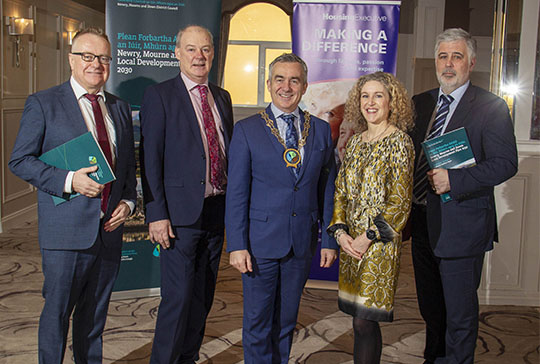Collaboration is Key to Addressing Housing Need
Newry Mourne and Down District Council hosted a major Social and Affordable Housing Conference on Tuesday 25 February in the Canal Court Hotel & Spa in recognition of the social housing need within the district.
Over 110 representatives from across the district attended the event, including statutory agencies, housing professionals, MP’s, elected members and the community and voluntary sector. The conference, facilitated by Professor Paddy Gray, Chartered Institute of Housing, looked at the challenges and potential opportunities for collaboration to address housing need in Newry, Mourne and Down.

Newry Mourne and Down District Council Chairman, Councillor Mark Murnin said: “This has been a very successful event highlighting the challenges faced by statutory agencies and housing professionals. Because of the information presented by the key note speakers and the feedback from the delegates, I am delighted to announce that a Housing Sub-Group will now be formed to tackle the issues and challenges faced in social housing within our district.
“Poor housing affects all aspects of people’s lives and can be detrimental to health and wellbeing as well as the economy. The conference provided statutory agencies, elected members and voluntary organisations with an opportunity to explore and collaborate on key issues to find solutions that will make a difference to the people within our district. I welcome any actions from the conference that help to address social and affordable housing demand now and in the future.”
Opening the conference, Dr Gray provided insight into ‘Housing Strategy and Social Policy’. Presentations were also heard from Newry Mourne and Down District Council Chief Executive, Liam Hannaway – ‘Setting the scene in Newry, Mourne and Down’, which focused on the importance quality, available housing as fundamental to wellbeing and the role of the Community Plan and the Local Development Plan in providing homes for all. Clark Bailie, Chief Executive of the Northern Ireland Housing Executive (NIHE), highlighted the housing need within Newry, Mourne and Down – 3,166 people are on the waiting list, in which 2,388 are classed as being in housing stress – and highlighted the work NIHE is doing to address this; and Louise Warde-Hunter Deputy Secretary, Department for Communities, outlined short, medium and long-term solutions needed to tackle social and affordable housing demands.
The delegates also had the opportunity to have their say… a panel of experts were on hand to answer participants’ questions and a wide-ranging discussion of potential issues took place. The conference also provided an opportunity for the delegates to collaborate with each other to identify further actions that need to be taken on a number of key topics including: Encourage Development of Social Housing, Planning Long Term Needs, Tackling Homelessness and the Poverty Gap, Accessible Housing and Special Housing Provision. A key outcome from this collaborative working was the agreement to form a Housing Sub-Group to address issues such as the changing needs of the district, developing solutions for the ageing population, maximisation of available land and mapping of public sector assets, addressing homelessness, Welfare Reform, and changing the stigma of social housing, all of which can only be overcome by working in partnership across all stakeholders.

Further Information about the presentations.
Chief Executive Liam Hannaway (Newry Mourne and Down District Council) focused on the importance of achieving the outcomes in the Community Plan and how housing impacts all outcomes, from Health and Wellbeing to the Economy. He also talked about the importance of breaking down housing need to DEA level as each area is different in geography and demography. He also talked about the Local Development Plan and the importance of planning for future housing need, accessibility and special housing / single occupancy dwellings, and solutions for an aging population.
Chief Executive NIHE, Clark Bailie provided an overview of Housing need. There are 3,166 people on the waiting list for social housing, in which 2,388 are classed as being in housing stress. He talked about homelessness in the district and said that there were 789 people who were classed as homeless in 2017/18. Some of the reasons for homelessness were recorded as 28% Accommodation not reasonable, 23% Sharing breakdown/ family dispute. Immediate housing demand 2017-27 is 1710 dwellings of which 700 are needed in Newry City, 173 Bessbrook/Derramore, 180 Newcastle, 166 Warrenpoint.
The Northern Ireland Housing Executive is putting measures in place to address housing need; 10 schemes delivering social housing have been completed, 21 schemes are on site which will provide 264 dwellings and 38 schemes which have potential to deliver 930 homes are programmed for 2019-2022.
Louise Warde-Hunter deputy secretary, Department for Communities, talked about Short, Medium and Long-Term Solutions to tackle social and affordable housing needs. Ms Warde-Hunter informed attendees the Programme for Government is to be used to frame plans around the future of Housing Policy in NI. The aim is to reduce housing stress by delivering new social and affordable housing by partnering with Co-Ownership.
This will deliver over 27000 affordable homes, 3750 homes are to be completed across NI by the end of the current period. Two pilot schemes – Rent to own and the Affordable Homes loan fund schemes will run and DfC will continue to scope out the potential to deliver more innovative affordable homes products. The challenge in the absence of an executive means delayed decisions and legislation, Brexit uncertainty and welfare reform, however DfC continue to work to deliver services and plan for the future.























